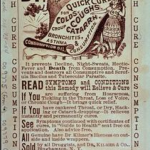 Dr. Gabor Maté argued to Alaska that, “The first question in addiction is not why the addiction, but why the pain? And if you understand a human being’s pain, you cannot look at their genes.” You can listen to his presentation at http://www.alaskapublic.org/2013/02/15/addiction-from-heroin-to-workaholism/ . While the proposed historical basis for his arguments are dubious, and the jargon makes one shudder to think of Fritz Perl voodoo and the modern profit center of “mental health”, there is a good deal to be said for a functional approach to addiction, and under the patina of the sloppy academics and loose jargon, that is, after all, what the good doctor is talking about.
Dr. Gabor Maté argued to Alaska that, “The first question in addiction is not why the addiction, but why the pain? And if you understand a human being’s pain, you cannot look at their genes.” You can listen to his presentation at http://www.alaskapublic.org/2013/02/15/addiction-from-heroin-to-workaholism/ . While the proposed historical basis for his arguments are dubious, and the jargon makes one shudder to think of Fritz Perl voodoo and the modern profit center of “mental health”, there is a good deal to be said for a functional approach to addiction, and under the patina of the sloppy academics and loose jargon, that is, after all, what the good doctor is talking about.
Maté, like some medical analog of D’Souza’s “nemesis”, argues that western imperialism is responsible for “addiction”, in that while tribal people may use psychoactive substances, they do so reverently and with cultural approval, and therefore not addictively. Apparently the pervasive and ubiquitous use of betel nut, coca leaf and other similar substances (Sullivan and Hagen), are overlooked by Maté. Maté only has eyes for noble savages, while Anthropology retired that trope years ago (Ellingson, Grinde et al., Hames.)
But the presentation, ”The Hungry Ghost: A Biospsychosocial Perspective on Addiction, from Heroin to Workaholism” based on the book “In The Realm of Hungry Ghosts: Close Encounters with Addiction“, can be forgiven the blood libel. The important bit is that Maté effectively makes the case that addicts are not necessarily the insane and mentally ill, nor deviant fiends bent on breaking the law; they are as likely to be persons doing their best to essentially self-medicate themselves to states in which they can survive.
And THAT serves as an excellent indictment of both the criminal justice approach to addiction AND the mental health approach to addiction. The former punishes the addict for attempting to comply with other’s rules, and the latter denies the rationality of the user.
I don’t want to sink in to some ridiculous libertarian rant about natural rights; that is not what this is about. What we have done, though, is created a religion in which the MDs are high priests and BigPharma are the keepers of the sacraments. If I can manage what ails me through moderate use of caffeine and marijuana, why should I not be permitted to do so? Is the threat of societal implosion from a 7% solution so extraordinary that we must so vehemently denounce so much of our world?
Perhaps what we need more of are not the empty chairs of Gestalt Therapy (yes, Clint was engaging in classic Gestalt therapy during the GOP convention) nor private prison beds (rendering Puritanism a profit center), but effective mediators. Once upon a time I think we called such people social workers; persons who went out in to the community and assisted others in coping with a society whose demands were in some respect more than one might be able to manage. We don;t need to talk about defective genes; we need to talk about a dysfunctional society, and what we can do to recognize and perhaps moderate the responses of some to that dismal fact of life. No, there are no silver bullets, but having some understanding of the underlying circumstances, and abandoning the Puritan intolerance that drives even those who deny same, will be a start.
Work Cited